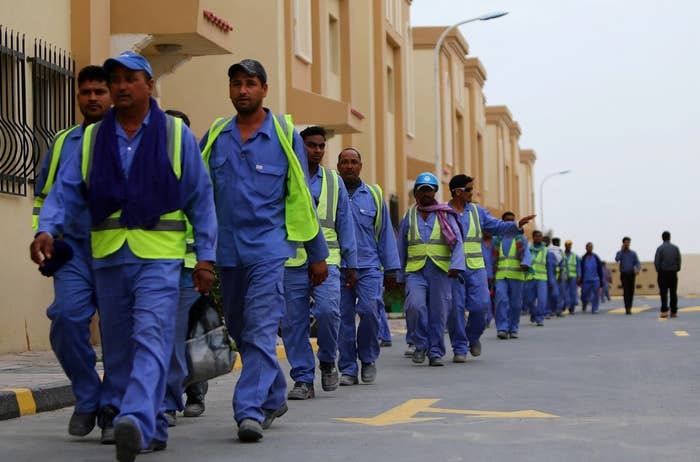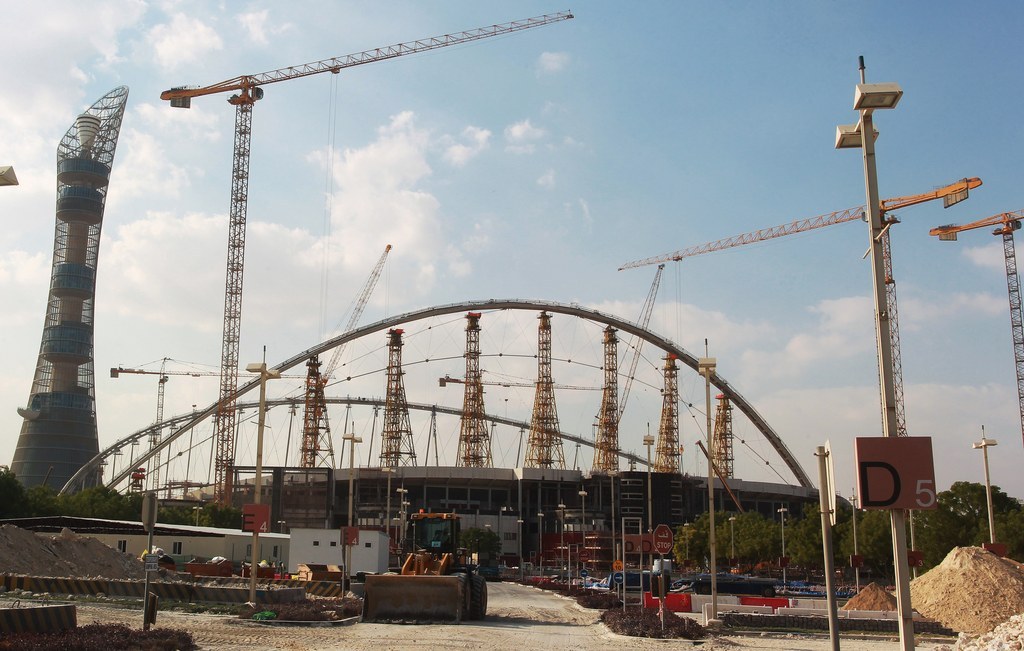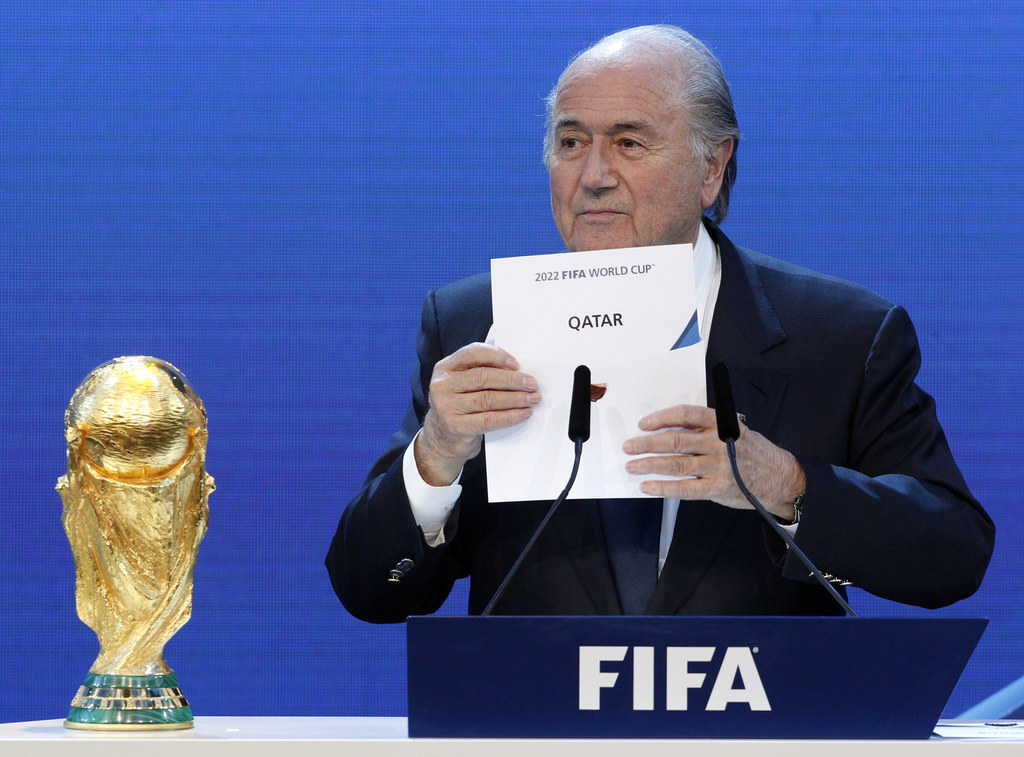An article by the BBC's Middle East Business Correspondent Mark Lobel claims that a team of BBC journalists were monitored, arrested and detained while covering the migrant labour used in Qatar's 2022 World Cup preparations.

In the piece, Lobel details the "dramatic" arrest of himself, a cameraman, translator and driver in Doha while they were on their way to interview laborers from Nepal during a press trip to the Gulf state.
Describing his detention, Lobel said:
Suddenly, eight white cars surrounded our vehicle and directed us on to a side road at speed..
A dozen security officers frisked us in the street, shouting at us when we tried to talk. They took away our equipment and hard drives and drove us to their headquarters.
Later, in city's main police station, the cameraman, translator, driver and I were interrogated separately by intelligence officers.
The questioning was hostile. We were never accused of anything directly, instead they asked over and over what we had done and who we had met.

Lobel said that, during his interrogation, he was denied the chance to make a phone call to let people know where he was, and was told that his detention was being treated as a matter of national security.
He was presented with photographic evidence showing that Qatari authorities had been trailing him since his arrival in the country, for two days before his arrest.
After being detained at Doha's main police station, Lobel was moved to a local prison at 1 a.m., before being interrogated further at the public prosecutor's office the following morning for several hours:
Thirteen hours of waiting around and questioning later, one of the interrogators snapped. "This is not Disneyland," he barked. "You can't stick your camera anywhere."
It was as if he felt we were treating his country like something to be gawped at, suggesting we thought of trips to see controversial housing and working conditions as a form of entertainment.
In perfect English and with more than a touch of malice, he threatened us with another four days in prison - to teach us a lesson.
The following morning, Lobel said he and his team were suddenly released and allowed to rejoin the organized press trip they were in the country for. However, their kit was still impounded, and they were not allowed to leave the country. No charges were ever brought against them.
After the publication of Lobel's article, the BBC told BuzzFeed News: "We are pleased that the BBC team has been released but we deplore the fact that they were detained in the first place."
"Their presence in Qatar was no secret and they were engaged in a perfectly proper piece of journalism. We are pressing the Qatari authorities for a full explanation and for the return of the confiscated equipment."

Lobel said he had been invited on the tour by the Qatari Prime Minister's office. London-based public relations firm Portland Communications has been liaising with international journalists on behalf of the Qatari government.
After his team's release from prison, Lobel said Portland "showed us spacious and comfortable villas for construction workers, with swimming pools, gyms and welfare officers."
BuzzFeed News contacted Portland Communications for comment, but they responded with this statement from Saif Al-Thani, the head of Qatar's Government Communications Office:
The Government Communications Office invited a dozen reporters to see – first-hand –some sub-standard labour accommodation as well as some of the newer labour villages. We gave the reporters free rein to interview whomever they chose and to roam unaccompanied in the labour villages...
Perhaps anticipating that the Government would not provide this sort of access, the BBC crew decided to do their own site visits and interviews in the days leading up to the planned tour. In doing so, they trespassed on private property, which is against the law in Qatar just as it is in most countries. Security forces were called and the BBC crew was detained...
By trespassing on private property and running afoul of Qatari laws, the BBC reporter made himself the story. We sincerely hope that this was not his intention. Moreover, we deeply regret that he was unable to report the real story, which is that the government and the private sector are making significant progress in efforts to improve the lives and the labour conditions of guest workers in Qatar."
The statement also said that, if the BBC reporters had waited until the set tour, "they would have been able to visit – in broad daylight –the very camps they tried to break into at night."
After Qatar's response, Lobel tweeted that the accusations were false, and said that he had still not had his belongings returned:
I'm not expecting much but an apology or just return of my phone would be nice. Our response to false accusations: http://t.co/xaanZYiH9K

BuzzFeed News contacted football's world governing body, FIFA, for comment on Lobel's arrest. In a statement, FIFA spokesman David Noemi said:
We are currently seeking clarity from the Qatari authorities of the situation that the BBC has contacted us about. Any instance relating to an apparent restriction of press freedom is of concern to FIFA and will be looked into with the seriousness it deserves.
Speaking generally, FIFA fully respects the freedom of the press and believes the freedom of movement for journalists is of utmost importance. Editorial independence in the coverage of FIFA events has been, and continues to be guaranteed and this principle is for example enshrined in our media accreditation terms and conditions for the respective competitions.
At the same, the general rules of the respective host countries should be respected by media when it comes to filming and gaining the necessary permissions.
The organizers of the Qatar 2022 World Cup have come into widespread criticism for their treatment of migrant construction workers, many of whom come from Nepal and are said to be subject to long hours, poor conditions and long, fixed-term contracts which can leave them open to exploitation.
According to The Guardian, migrant laborers working on World Cup infrastructure in Qatar died at a rate on one every two days during 2014.
Earlier this month, a German camera crew were also detained in Qatar while reporting on World Cup preparations.
